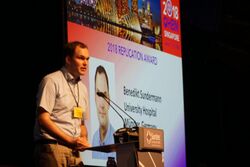Biology:OHBM Replication Award
| OHBM Replication Award | |
|---|---|
| Presented by | Organization for Human Brain Mapping (OHBM) |
| First awarded | 2017 |
| Currently held by | Charles Laidi for "Cerebellar Atypicalities in Autism?" (awarded in 2023) |
| Website | humanbrainmapping |
The OHBM Replication Award is an award presented annually by the Organization for Human Brain Mapping (OHBM). It is presented to a researcher in recognition of conducting and disseminating the results of a neuroimaging replication study of exceptional quality and impact.
Winners
| Year | Researcher | Scientific Article |
|---|---|---|
| 2023 | Charles Laidi | "Cerebellar Atypicalities in Autism?"[1] |
| 2022 | Lara J. Mentink | "Functional co-activation of the default mode network in APOE ε4-carriers: A replication study"[2] |
| 2021 | Mingrui Xia | "Reproducibility of functional brain alterations in major depressive disorder: Evidence from a multisite resting-state functional MRI study with 1,434 individuals" [3] |
| 2020 | Andre Altmann | "A comprehensive analysis of methods for assessing polygenic burden on Alzheimer’s disease pathology and risk beyond APOE"[4] |
| 2019 | Richard Dinga | "Evaluating the evidence for biotypes of depression: Methodological replication and extension of Drysdale et al. (2017)"[5] |
| 2018 | Benedikt Sundermann | "Diagnostic classification of unipolar depression based on resting-state functional connectivity MRI: effects of generalization to a diverse sample"[6] |
| 2017 | Wouter Boekel | "A purely confirmatory replication study of structural brain-behavior correlations"[7] |
History
The award was originally conceived by Chris Gorgolewski as an attempt to elevate the status of replication studies, which were often considered not as prestigious as other scientific activities. Researchers focusing too much on novel discoveries instead of scrutinizing previously published findings was big contribution to reproducibility crisis in psychology.
The award has increased the likelihood of members of the neuroimaging community to conduct and disseminate results of replication studies[8] and the procedure of running the award has been made publicly available[9] in hope other academic communities could implement similar awards.
See also
- List of neuroscience awards
References
- ↑ Laidi, Charles; Floris, Dorothea L.; Tillmann, Julian; Elandaloussi, Yannis; Zabihi, Mariam; Charman, Tony; Wolfers, Thomas; Durston, Sarah et al. (October 2022). "Cerebellar Atypicalities in Autism?". Biological Psychiatry 92 (8): 674–682. doi:10.1016/j.biopsych.2022.05.020. ISSN 0006-3223. https://doi.org/10.1016/j.biopsych.2022.05.020.
- ↑ Mentink, Lara J.; Guimarães, João P.O.F.T.; Faber, Myrthe; Sprooten, Emma; Olde Rikkert, Marcel G.M.; Haak, Koen V.; Beckmann, Christian F. (October 2021). "Functional co-activation of the default mode network in APOE ε4-carriers: A replication study". NeuroImage 240: 118304. doi:10.1016/j.neuroimage.2021.118304. PMID 34329959.
- ↑ Xia, Mingrui; Si, Tianmei; Sun, Xiaoyi; Ma, Qing; Liu, Bangshan; Wang, Li; Meng, Jie; Chang, Miao et al. (2019). "Reproducibility of functional brain alterations in major depressive disorder: Evidence from a multisite resting-state functional MRI study with 1,434 individuals". NeuroImage 189: 700–714. doi:10.1016/j.neuroimage.2019.01.074. ISSN 1053-8119. PMID 30716456.
- ↑ Altmann, Andre; Scelsi, Marzia A; Shoai, Maryam; de Silva, Eric; Aksman, Leon M; Cash, David M; Hardy, John; Schott, Jonathan M et al. (2020-01-01). "A comprehensive analysis of methods for assessing polygenic burden on Alzheimer's disease pathology and risk beyond APOE" (in en). Brain Communications 2 (1): fcz047. doi:10.1093/braincomms/fcz047. ISSN 2632-1297. PMID 32226939.
- ↑ Dinga, Richard; Schmaal, Lianne; Penninx, Brenda W.J.H.; van Tol, Marie Jose; Veltman, Dick J.; van Velzen, Laura; Mennes, Maarten; van der Wee, Nic J.A. et al. (2019). "Evaluating the evidence for biotypes of depression: Methodological replication and extension of". NeuroImage: Clinical 22: 101796. doi:10.1016/j.nicl.2019.101796. ISSN 2213-1582. PMID 30935858.
- ↑ Sundermann, Benedikt; Feder, Stephan; Wersching, Heike; Teuber, Anja; Schwindt, Wolfram; Kugel, Harald; Heindel, Walter; Arolt, Volker et al. (2016). "Diagnostic classification of unipolar depression based on resting-state functional connectivity MRI: effects of generalization to a diverse sample". Journal of Neural Transmission 124 (5): 589–605. doi:10.1007/s00702-016-1673-8. ISSN 0300-9564. PMID 28040847.
- ↑ Boekel, Wouter; Wagenmakers, Eric-Jan; Belay, Luam; Verhagen, Josine; Brown, Scott; Forstmann, Birte U. (2015). "A purely confirmatory replication study of structural brain-behavior correlations". Cortex 66: 115–133. doi:10.1016/j.cortex.2014.11.019. ISSN 0010-9452. PMID 25684445. https://dare.uva.nl/personal/pure/en/publications/a-purely-confirmatory-replication-study-of-structural-brainbehavior-correlations(8d58acc6-5946-47ba-83b0-05cf2215b4b1).html.
- ↑ Gorgolewski, Krzysztof J.; Nichols, Thomas; Kennedy, David N.; Poline, Jean-Baptiste; Poldrack, Russell A. (2018). "Making replication prestigious". Behavioral and Brain Sciences 41: e131. doi:10.1017/S0140525X18000663. ISSN 0140-525X. PMID 31064546.
- ↑ Gorgolewski, Krzysztof; Nichols, Thomas; N. Kennedy, David; Poline, Jean-Baptiste; Poldrack, Russell (2017-11-03) (in en). Replication Award Creation Kit. doi:10.6084/m9.figshare.5567083.v1. https://figshare.com/articles/Replication_Award_Creation_Kit/5567083.
 |


